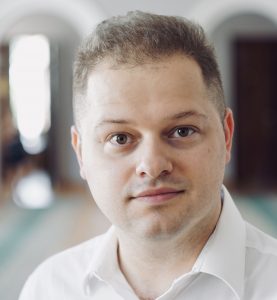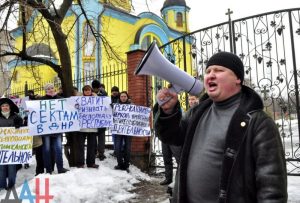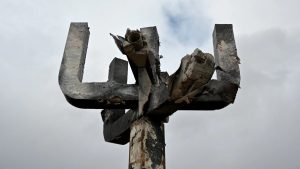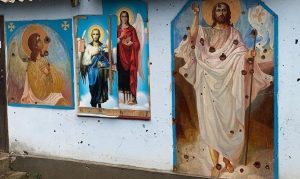
Dmytro Vovk is a visiting associate professor at Benjamin N. Cardozo School of Law and Director of the Centre for the Rule of Law and Religion Studies, Yaroslav Mudryi National Law University (Ukraine).
I’d like to start by saying that contemporary Ukraine and Russia are antipodes in many respects, including with respect to religious freedom. While Ukraine has one of the most liberal religious legal frameworks in the region and a highly competitive religious market, Russia has managed to create a very restrictive religious legislation with one religion, the Russian Orthodox Church, being strongly endorsed and many religious minorities being severely discriminated against and oppressed. This stark contrast between Russia and Ukraine goes far beyond religion, and it is not an exaggeration to say that the Russia-Ukraine war is the war between two opposite political systems, where Ukraine’s is based on freedom and competition, while Russia’s is based on lack of freedom and on oppression.
The war, starting with the annexation of Crimea and the military conflict in eastern Ukraine and continuing with Russia’s full-scale invasion, has had a tremendous effect on freedom of religion or belief and other related human rights in the region. The reality of the territories occupied by Russia, first in 2014 and again in 2022, has become one of murders, tortures (including fake executions), forced detentions, forced displacement of priests and believers, acts of vandalism, and expropriations of religious properties, as well as religious discrimination and social hatred of religious minorities inspired and directed by Russian proxies and then by Russian occupation administrations.

Religious regimes established in the occupied territories, however, have not been homogeneous. While in Crimea the Russian government has planted the whole spectrum of religious restrictions previously implemented inside the Russian Federation, in eastern Ukraine these restrictions and repressions have been accompanied by numerous acts of pure violence committed by the Russian military and paramilitary groups.
Since the beginning of the full-scale invasion, Russia has continued to engage in religious repressions in newly occupied territories. In particular, human rights monitors reported searches on the premises of Greek Catholic, Protestant, and Jehovah’s Witnesses communities, as well as in parishes belonging to the Orthodox Church of Ukraine (OCU). At least 26 religious figures were murdered; many more Orthodox, Greek Catholic, and Protestant priests and believers were detained, tortured, and subjected to humiliating treatment. For example, in March 2022, OCU priest Myron Zvarychuk was murdered in Bucha (the Kyiv region), when the city was under Russian occupation. Melitopol-based Protestant pastor Dmytro Bodyu was arrested and threatened with murder. Since November 2022, two Greek Catholic clerics, Ivan Levytskyi and Bohdan Haleta, have been detained in Berdyansk. They are being tortured and accused of “storing explosives.”
Many religious properties were captured and used for military or other purposes (such as snipers’ nests). Several religious buildings were looted and decimated, as were religious items, including cases of Bibles burned in Protestant churches and icons shot through in Orthodox churches. According to the Kyiv-based Institute of Religious Freedom’s report, from February 2022 to 31 January 2023, the Russian military destroyed and damaged about 500 religious buildings. The tragedy of Russian collateral damage also included the memorial site of Babyn Yar—the site of a 1941 Nazi massacre of more than 33,000 Jews—in addition to the Holocaust memorial of Drobytskyi Yar, where its menorah monument was severely damaged by Russian shelling.

A bitter irony is that almost a third of these buildings belong to the Ukrainian Orthodox Church (UOC), historically and ecclesiastically affiliated with the Moscow Patriarchate. In his speech of 21 February 2022, Vladimir Putin accused the Ukrainian government of alleged preparations “to destroy” the UOC of the Moscow Patriarchate. As we’ve already seen, Putin decided to prevent this “destruction” of the UOC—the denomination that constitutes the religious majority in eastern and southern Ukraine—by employing the Russian army to ruin its buildings and murder its believers.
The relationship between the Ukrainian government and the Ukrainian Orthodox Church of the Moscow Patriarchate in times of the war is an important topic. We know that the leadership of the Russian Orthodox Church (ROC), primarily Moscow Patriarch Kirill, has blessed and endorsed Russia’s aggressive war against Ukraine. In their attempts to justify Russia’s attack on Ukraine and war crimes committed by the Russian military, high-level ROC clerics argue that, in Ukraine, Russia is conducting war against “Nazism,” “Satanism,” and “the Antichrist.” As a result, Ukrainian society has an extremely negative perception of the UOC’s links to Moscow, even though the Church insists it is now fully independent.
There have also been cases of Moscow Patriarchate priests collaborating with Russian troops and occupation administrations. The Security Service of Ukraine reported 60 criminal cases against UOC clerics involved in spying, justifying Russian aggression against Ukraine, and inciting religious hatred in occupied territories. At least two of these clerics were traded in prison exchanges with Russia, at Russia’s request.

These cases are among the reasons President Zelensky requested the Cabinet of Ministers to develop a draft law banning religious organizations affiliated with Russia. The draft law was submitted to the Ukrainian Parliament in January and is expected to be adopted this month. Based on this law, the UOC-MP and some other, significantly smaller religious groups could potentially be banned.
This legislation, or course, implicates religious freedom. On one hand, religious freedom is not in any way an excuse for calls to violate state sovereignty or territorial integrity or for collaboration with Russian military forces. On the other hand, international human rights standards emphasize that, while counteracting national security threats, the government should focus on concrete individuals involved in illegal activities, not on the whole religious group or religion in general.
Overall, it’s Russia’s occupied territories that produce the biggest challenge to religious freedom in Ukraine. The bloody Russian attack against Ukraine has turned one of the most religiously pluralistic Ukrainian regions into the territory with the grossest violations of religious freedom in Europe. Several religious groups, which had been flourishing before 2014, have disappeared or left the occupied territories and the warzone, and many of them presumably will never come back,even when the war is over.
This raises the question of Russia’s responsibility. Those who must be held accountable include Russian political and military leaders, as well as Russian state media propagandists and religious leaders who have contributed to the rise of Russian imperialist nationalism, the inflammation of this unjust war, and its promotion and normalization in Russian society. The issue of Russia’s responsibility should be a major focus for Western supporters of Ukraine, including the United States, as it is a necessary component of restoring international order and protecting freedom regionally and globally.
Given the above, I recommend that the Commission do the following:
- continue monitoring the situation and produce an analytical report focused on religious freedom violations in the Ukrainian territories occupied by Russia.
- recommend the initiation of sanctions and travel bans against persons involved in violations of religious freedom in Russia and the Ukrainian territories occupied by Russia, including the leadership of the Russian Orthodox Church and Moscow Patriarch Kirill personally.
- Encourage the U.S. Congress to earmark funds for restoring Ukraine’s cultural sites, including religious buildings of historical and cultural significance.
Facilitate legal support for the Ukrainian government to develop legislation dealing with national security issues in the religious domain.
